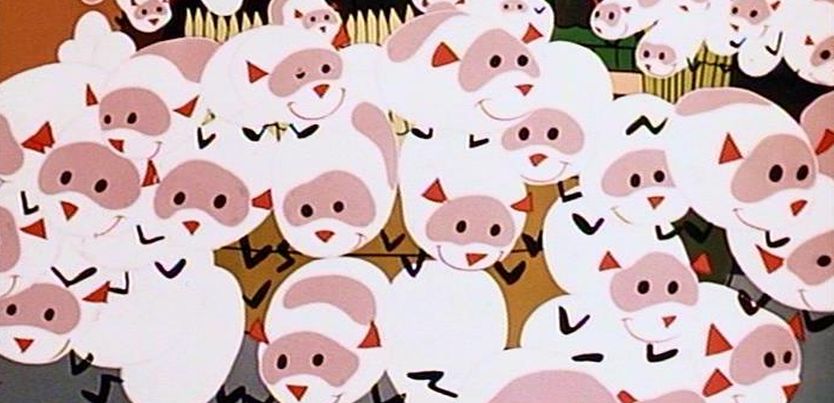 This humorous story by Ellis Parker Butler illustrates how excessive bureaucracy can have dire consequences. A customer argues with a railway freight agent who claims that two guinea pigs he has been sent should be charged as common pigs (sixty cents) rather than pets (fifty cents). The customer leaves the pigs with the agent, planning to collect them after complaining to the freight company’s Head Office. By the time the matter is settled in the customer’s favour, the ten-cent dispute has almost brought the company to its knees. Themes include misinterpretation, stubbornness, bureaucracy gone awry. More…
This humorous story by Ellis Parker Butler illustrates how excessive bureaucracy can have dire consequences. A customer argues with a railway freight agent who claims that two guinea pigs he has been sent should be charged as common pigs (sixty cents) rather than pets (fifty cents). The customer leaves the pigs with the agent, planning to collect them after complaining to the freight company’s Head Office. By the time the matter is settled in the customer’s favour, the ten-cent dispute has almost brought the company to its knees. Themes include misinterpretation, stubbornness, bureaucracy gone awry. More…
Archives
A Work of Art
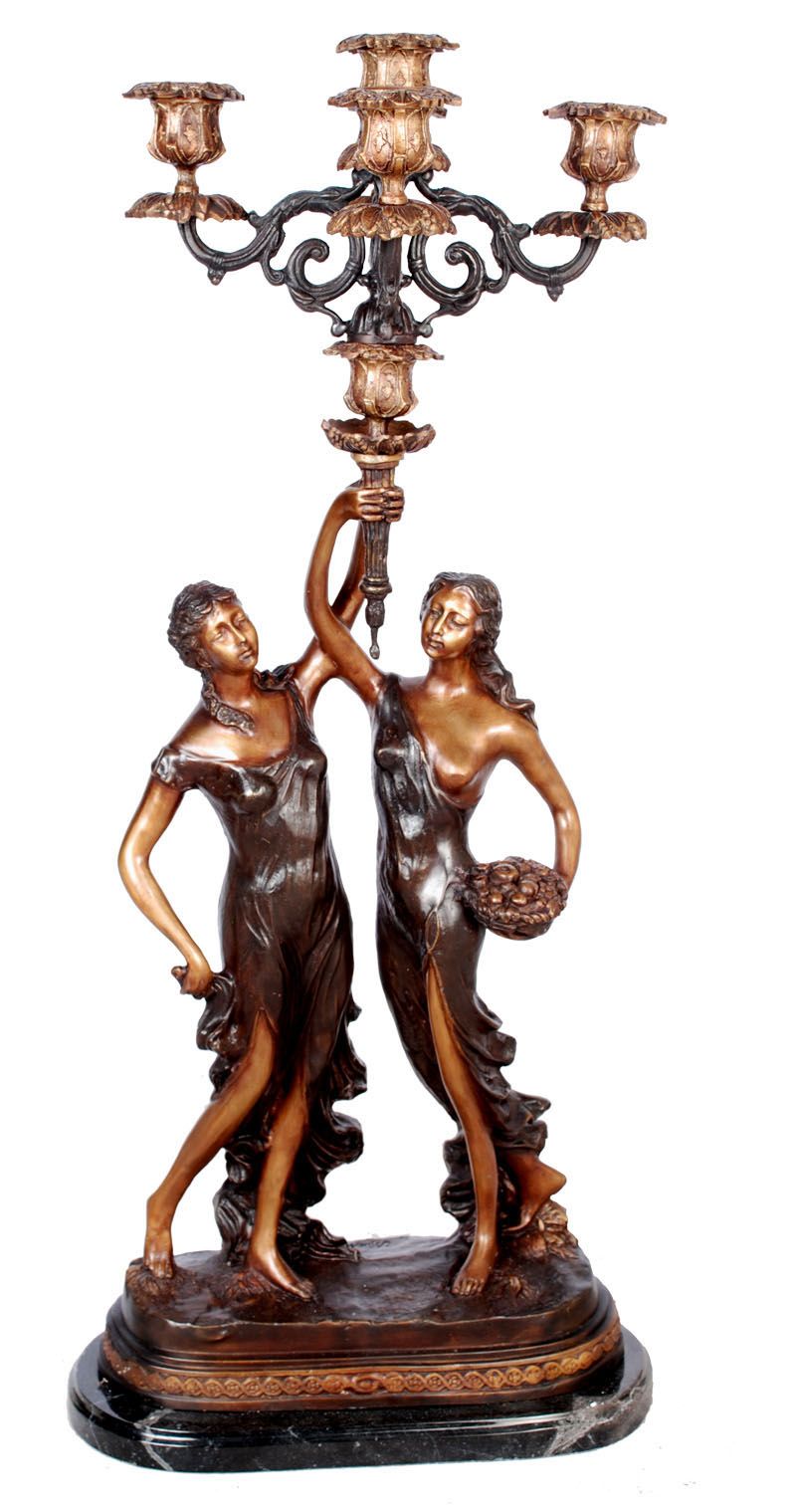 In this Anton Chekhov story the mother of a man too poor to pay for treatment sends his doctor a gift in gratitude for saving his life. There is only one problem: the gift, an antique bronze candelabra, features statuettes of two naked women in a not safe for work or home pose. The doctor passes it on as an unwelcome gift to his lawyer, who in turn donates it at a benefit for an aspiring comic actor. Unfortunately for the doctor, the actor decides to sell it. Themes include gratitude, perception (the subjectivity of art appreciation), morality, appearance, coincidence. More…
In this Anton Chekhov story the mother of a man too poor to pay for treatment sends his doctor a gift in gratitude for saving his life. There is only one problem: the gift, an antique bronze candelabra, features statuettes of two naked women in a not safe for work or home pose. The doctor passes it on as an unwelcome gift to his lawyer, who in turn donates it at a benefit for an aspiring comic actor. Unfortunately for the doctor, the actor decides to sell it. Themes include gratitude, perception (the subjectivity of art appreciation), morality, appearance, coincidence. More…
The Toxic Donut
 In this story by Terry Bisson, a woman has been nominated from entries all over the world to represent humanity in an annual TV extravaganza. The focus of the show, set in the future and officiated over by world leaders, is Environmental Awareness. One of its features is a “Wonders of Science” film segment celebrating technology that can concentrate a whole year’s toxic wastes and pollutants into a single donut. In the finale, the donut for the previous year is presented to the world. The unwitting woman’s role is to eat it. Themes include environmentalism, science and technology, human sacrifice. More…
In this story by Terry Bisson, a woman has been nominated from entries all over the world to represent humanity in an annual TV extravaganza. The focus of the show, set in the future and officiated over by world leaders, is Environmental Awareness. One of its features is a “Wonders of Science” film segment celebrating technology that can concentrate a whole year’s toxic wastes and pollutants into a single donut. In the finale, the donut for the previous year is presented to the world. The unwitting woman’s role is to eat it. Themes include environmentalism, science and technology, human sacrifice. More…
A Shocking Accident
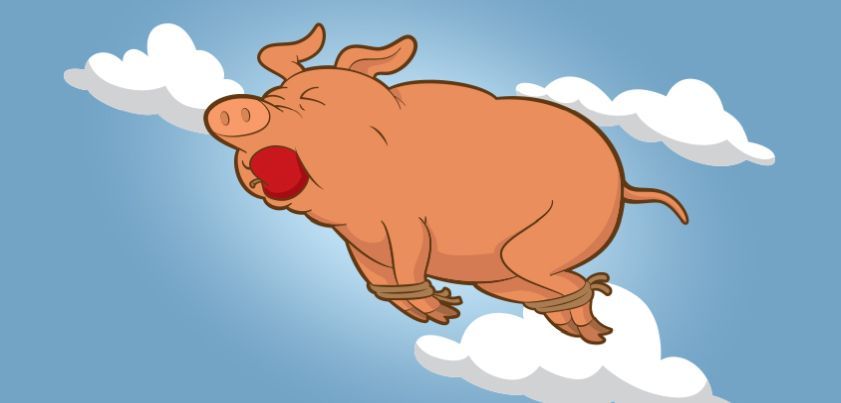 Graham Greene’s short stories span many genres, from the serious to the farcical. In this comedy, a boy rationalizes his widowed father’s long absences from home by convincing himself that he is a mysterious adventurer. In reality, his father is a restless author whose unlikely death in an Italian “street accident” becomes an embarrassment the lad must carry into adulthood. Things change when he falls in love with a woman who shares a similar concern for the fate of animals. Themes: father-son relationships, perception, the unpredictability of life/death, communicating bad news, fear of ridicule. More…
Graham Greene’s short stories span many genres, from the serious to the farcical. In this comedy, a boy rationalizes his widowed father’s long absences from home by convincing himself that he is a mysterious adventurer. In reality, his father is a restless author whose unlikely death in an Italian “street accident” becomes an embarrassment the lad must carry into adulthood. Things change when he falls in love with a woman who shares a similar concern for the fate of animals. Themes: father-son relationships, perception, the unpredictability of life/death, communicating bad news, fear of ridicule. More…
The Money-Box
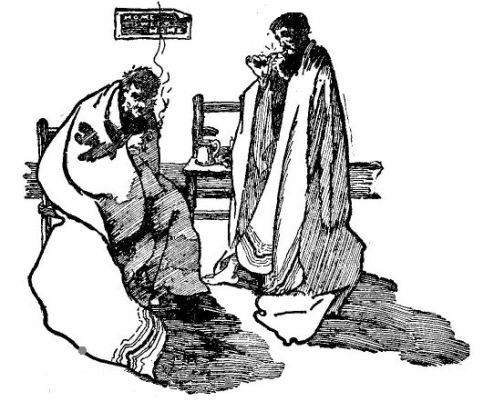 Modern readers tend to associate W. W. Jacobs with tales of the macabre, such as his famous The Monkey’s Paw. What few realize is that most of his stories were humorous. His favorite subjects were ships and those who sail in them, and how tricksters take advantage of slow-witted villagers. In this story, two sailors tired of squandering their wages in the first few days ashore trust their pay to a very steady old teetotaler who agrees to give them a moderate amount each day. Needless to say, they soon regret the decision. Themes: money, irresponsibility, temperance, duty. More…
Modern readers tend to associate W. W. Jacobs with tales of the macabre, such as his famous The Monkey’s Paw. What few realize is that most of his stories were humorous. His favorite subjects were ships and those who sail in them, and how tricksters take advantage of slow-witted villagers. In this story, two sailors tired of squandering their wages in the first few days ashore trust their pay to a very steady old teetotaler who agrees to give them a moderate amount each day. Needless to say, they soon regret the decision. Themes: money, irresponsibility, temperance, duty. More…
The Lumber Room
 This humorous story by Saki describes a clever but mischievous boy’s efforts to explore the wonders of his house’s off-limits-to-children lumber-room. [Not to be confused with planks of wood, the word “lumber” here is a British term for miscellaneous stored articles.] In disgrace for putting a frog in his breakfast bowl, the boy devises an elaborate plan to distract his strict aunt while in the forbidden room. His day gets even better when the suspicious woman falls into a rain-water tank and he tricks her into giving him cause to leave her there. Themes: mischief, curiosity, imagination, oppression, defiance More…
This humorous story by Saki describes a clever but mischievous boy’s efforts to explore the wonders of his house’s off-limits-to-children lumber-room. [Not to be confused with planks of wood, the word “lumber” here is a British term for miscellaneous stored articles.] In disgrace for putting a frog in his breakfast bowl, the boy devises an elaborate plan to distract his strict aunt while in the forbidden room. His day gets even better when the suspicious woman falls into a rain-water tank and he tricks her into giving him cause to leave her there. Themes: mischief, curiosity, imagination, oppression, defiance More…
The Love Potion
 A major theme of this Herman Bosman story is the importance of tradition, myth and storytelling in the lives of Boer settlers. The narrator begins by asserting that everyone in the Marico knows that juba-berry juice can make a woman fall in love with a man. He then relates a tongue-in-cheek story of how he once “helped” a shy policeman use the juice to win a girl’s heart. The ambiguous ending leaves it unclear whether the potion really worked. Other themes: love, fear of rejection, superstition/magic vs. reality, morality (lack of respect for the girl and her right to decide). More…
A major theme of this Herman Bosman story is the importance of tradition, myth and storytelling in the lives of Boer settlers. The narrator begins by asserting that everyone in the Marico knows that juba-berry juice can make a woman fall in love with a man. He then relates a tongue-in-cheek story of how he once “helped” a shy policeman use the juice to win a girl’s heart. The ambiguous ending leaves it unclear whether the potion really worked. Other themes: love, fear of rejection, superstition/magic vs. reality, morality (lack of respect for the girl and her right to decide). More…
The Kugelmass Episode
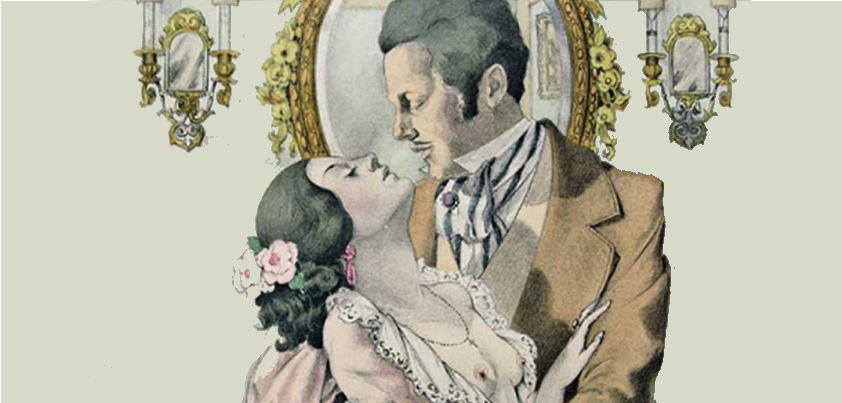 This Woody Allen story includes elements of fantasy, science fiction and farce. Kugelmass, bored with his “oafish” wife, wants a lustful extra-marital affair with no commitments either way. His wish seemingly comes true when a failed magician offers him a chance to seduce any woman from world literature. His first choice begins well, but ends badly; his second proves disastrous. The story is a cutting satire of America’s 1970s ‘Me’ culture. Themes include psychological well-being, marital relationships and casual sex. Ironically, instead of “having” the affair he wanted, Kugelmass spends the rest of eternity running from hairy, long-legged Spanish “haves”. More…
This Woody Allen story includes elements of fantasy, science fiction and farce. Kugelmass, bored with his “oafish” wife, wants a lustful extra-marital affair with no commitments either way. His wish seemingly comes true when a failed magician offers him a chance to seduce any woman from world literature. His first choice begins well, but ends badly; his second proves disastrous. The story is a cutting satire of America’s 1970s ‘Me’ culture. Themes include psychological well-being, marital relationships and casual sex. Ironically, instead of “having” the affair he wanted, Kugelmass spends the rest of eternity running from hairy, long-legged Spanish “haves”. More…
The Awful Fate of Melpomenus Jones
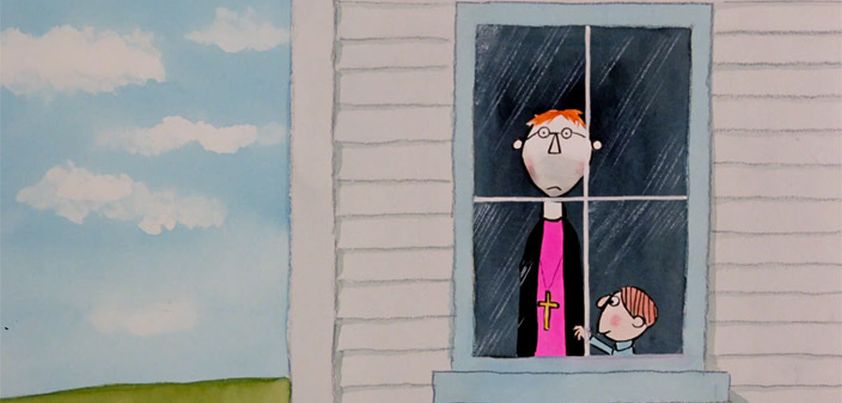 This story by Stephen Leacock takes a sarcastic look at the themes of shyness and polite social conventions. Many readers mistakenly associate Melpomenus’s refusal to give a false reason to leave the house with his being a clergyman. Not so! In the introduction we are told the young curate was too modest (shy) to tell a lie. His downfall is because of shyness, not honesty. However, the absurd outcome is as much the over-polite hosts’ fault as it is Melpomenus’s. If anyone was responsible for his spirit rushing from the house like a hunted cat, it was them. More…
This story by Stephen Leacock takes a sarcastic look at the themes of shyness and polite social conventions. Many readers mistakenly associate Melpomenus’s refusal to give a false reason to leave the house with his being a clergyman. Not so! In the introduction we are told the young curate was too modest (shy) to tell a lie. His downfall is because of shyness, not honesty. However, the absurd outcome is as much the over-polite hosts’ fault as it is Melpomenus’s. If anyone was responsible for his spirit rushing from the house like a hunted cat, it was them. More…
Lord Arthur Savile’s Crime
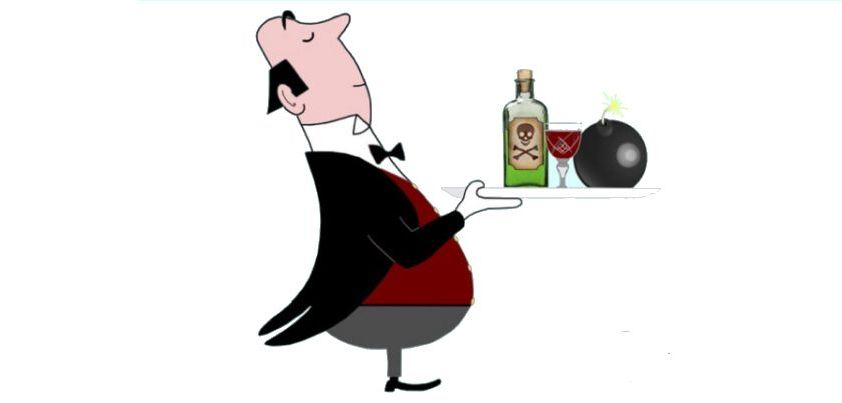 This dark comedy from Oscar Wilde involves a gullible young aristocrat who believes a palm-reader’s prediction that he will commit a murder. Out of consideration for his fiancé, he decides that he should postpone their marriage until he can get the deed out of the way. Convinced that he is merely fulfilling his destiny, the young man feels no guilt in planning and preparing for murder, or indeed remorse afterwards. When he later learns that the palm-reader was a charlatan, he still has no regrets. Themes: the shallowness and hypocrisy of the Victorian upper class, destiny, murder, morals, karma. More…
This dark comedy from Oscar Wilde involves a gullible young aristocrat who believes a palm-reader’s prediction that he will commit a murder. Out of consideration for his fiancé, he decides that he should postpone their marriage until he can get the deed out of the way. Convinced that he is merely fulfilling his destiny, the young man feels no guilt in planning and preparing for murder, or indeed remorse afterwards. When he later learns that the palm-reader was a charlatan, he still has no regrets. Themes: the shallowness and hypocrisy of the Victorian upper class, destiny, murder, morals, karma. More…
Like the Sun
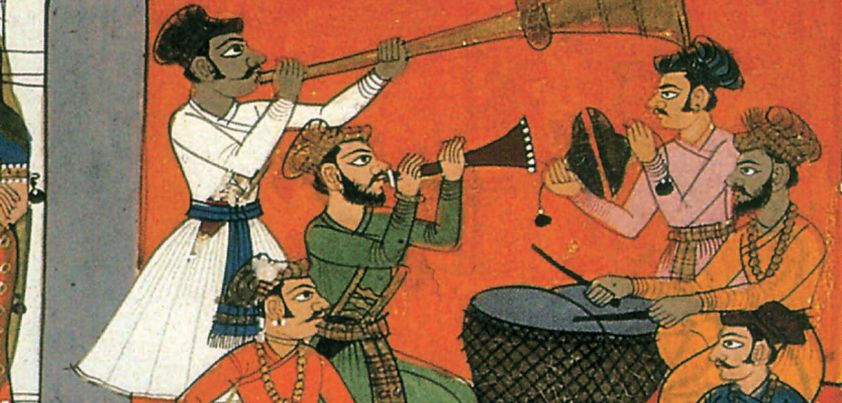 The major theme of this story by R. K. Narayan is the nature and consequences of truth. After observing that relationships involve tempering truth so as not to hurt one another, the protagonist adds that life is not worth living without telling nothing but the truth at least one day each year. On one of these days, his honesty upsets three people. The first two are needlessly hurt; the third, although unhappy, benefits from his frankness. The story shows that truth is indeed like the sun: most of the time warm and nourishing, but also capable of causing serious damage. More…
The major theme of this story by R. K. Narayan is the nature and consequences of truth. After observing that relationships involve tempering truth so as not to hurt one another, the protagonist adds that life is not worth living without telling nothing but the truth at least one day each year. On one of these days, his honesty upsets three people. The first two are needlessly hurt; the third, although unhappy, benefits from his frankness. The story shows that truth is indeed like the sun: most of the time warm and nourishing, but also capable of causing serious damage. More…
Death by Scrabble
 You know that a story which begins It’s a hot day and I hate my wife is not going to end well for one of them. In this story by Charlie Fish, a bored couple sit down for a “friendly” game of scrabble. As the competition intensifies, the man notices something strange. The words the couple put down on the board seem to be coming true in the room around them. To test the theory, he puts down the letters Q-U-A-K-E. As the ground begins to shake, he realizes too late that his wife has made the same discovery. More…
You know that a story which begins It’s a hot day and I hate my wife is not going to end well for one of them. In this story by Charlie Fish, a bored couple sit down for a “friendly” game of scrabble. As the competition intensifies, the man notices something strange. The words the couple put down on the board seem to be coming true in the room around them. To test the theory, he puts down the letters Q-U-A-K-E. As the ground begins to shake, he realizes too late that his wife has made the same discovery. More…
Outside
 Etgar Keret’s Outside was published in July, 2020, just over six months into the Covid-19 epidemic. Eighteen months later, we are now into our third wave of the disease. The story is a humorous account of the effects of being locked-down at home. The experience so traumatizes the protagonist that, along with thousands of others, he refuses to leave home when things improve. Forced outside by the army, he struggles to remember where to go and what to do. Fortunately, a chance encounter on the way to an ATM triggers a conditioned response that immediately brings him back to normal. More…
Etgar Keret’s Outside was published in July, 2020, just over six months into the Covid-19 epidemic. Eighteen months later, we are now into our third wave of the disease. The story is a humorous account of the effects of being locked-down at home. The experience so traumatizes the protagonist that, along with thousands of others, he refuses to leave home when things improve. Forced outside by the army, he struggles to remember where to go and what to do. Fortunately, a chance encounter on the way to an ATM triggers a conditioned response that immediately brings him back to normal. More…
Chivalry
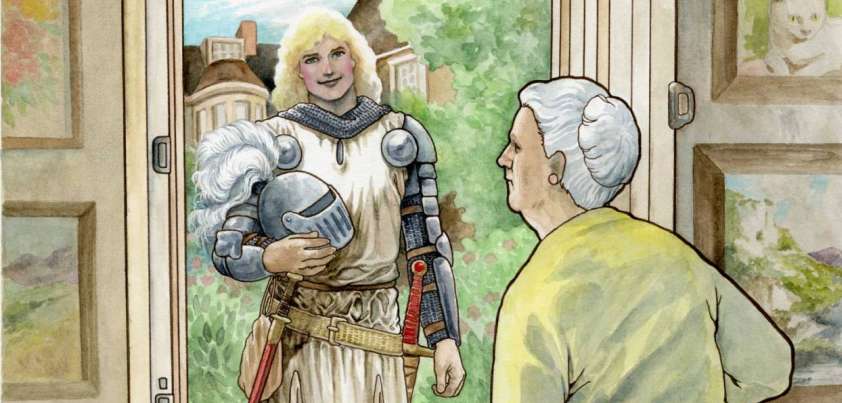 This Neil Gaiman fantasy features a nice old lady with nice friends, who lives in a nice house in a nice neighborhood. She was also living a nice, peaceful life until one day her routine was interrupted by Sir Galahad on a quest to find the Holy Grail. Having recently bought the Grail at an op-shop, the woman refuses Galahad’s offers of the Sword of Invincibility and Apple of (eternal) Life in exchange. Fortunately, the lad finds two other items she thinks would look better on the mantelpiece. Themes include civility and respect, patience, perseverance, and contentment in old age. More…
This Neil Gaiman fantasy features a nice old lady with nice friends, who lives in a nice house in a nice neighborhood. She was also living a nice, peaceful life until one day her routine was interrupted by Sir Galahad on a quest to find the Holy Grail. Having recently bought the Grail at an op-shop, the woman refuses Galahad’s offers of the Sword of Invincibility and Apple of (eternal) Life in exchange. Fortunately, the lad finds two other items she thinks would look better on the mantelpiece. Themes include civility and respect, patience, perseverance, and contentment in old age. More…
Filboid Studge
 This story is from Saki is a spoof on modern advertising. A businessman who had invested all his money into a failed breakfast food requests help from an impoverished artist who wants to marry his daughter. The artist gives the product an unappetising name and promotes it with a poster of celebrities in Hell clamouring for the unpalatable dish “they cannot buy now”. Sales take off, and the businessman sells the company and marries his daughter to someone a “vast deal higher” than the hapless artist. Themes include despair, the power of advertising, branding (appeal to duty/guilt), social class, ingratitude/betrayal. More…
This story is from Saki is a spoof on modern advertising. A businessman who had invested all his money into a failed breakfast food requests help from an impoverished artist who wants to marry his daughter. The artist gives the product an unappetising name and promotes it with a poster of celebrities in Hell clamouring for the unpalatable dish “they cannot buy now”. Sales take off, and the businessman sells the company and marries his daughter to someone a “vast deal higher” than the hapless artist. Themes include despair, the power of advertising, branding (appeal to duty/guilt), social class, ingratitude/betrayal. More…
The Baby (The First Thing the Baby Did Wrong)
 This story by Donald Barthelme may be confronting for some readers because it appears to make light of an example of child abuse. Through exaggeration and humor, Barthelme leads us to his central theme: the coming of a baby can change the whole dynamics of family relationships. Most parents like to think that they are the ones in control. However, all too often they find themselves dancing to their child’s tune. By the end of the story, this baby has totally turned the tables. Some might even say that it has been guilty of a form of parental abuse! More…
This story by Donald Barthelme may be confronting for some readers because it appears to make light of an example of child abuse. Through exaggeration and humor, Barthelme leads us to his central theme: the coming of a baby can change the whole dynamics of family relationships. Most parents like to think that they are the ones in control. However, all too often they find themselves dancing to their child’s tune. By the end of the story, this baby has totally turned the tables. Some might even say that it has been guilty of a form of parental abuse! More…
The Stout Gentleman
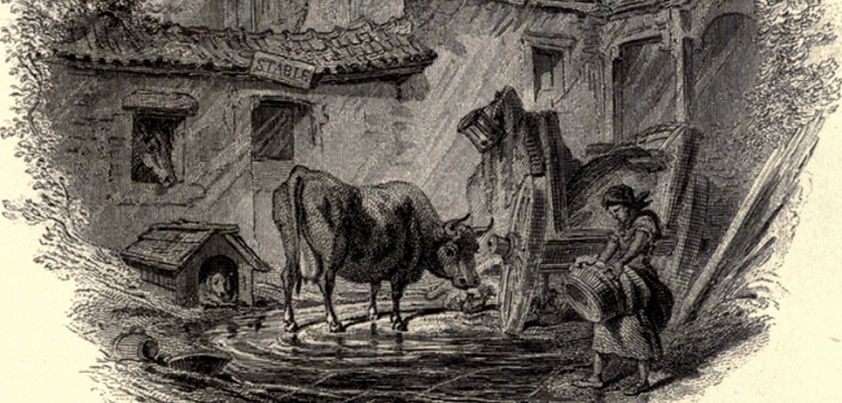 The major theme of this humorous story by Washington Irving is the extent to which we rely on appearance to judge others. A traveller staying at an inn is forced to remain indoors on a miserable, rainy Sunday. With nothing to do and no one to talk to, he passes the time by speculating as to the profession and social status of the only other guest, a demanding, seemingly sophisticated man who remains in his room all day. We learn little more about the other man, who the staff refer to only as the stout gentleman. Other themes: curiosity, obsession, identity. More…
The major theme of this humorous story by Washington Irving is the extent to which we rely on appearance to judge others. A traveller staying at an inn is forced to remain indoors on a miserable, rainy Sunday. With nothing to do and no one to talk to, he passes the time by speculating as to the profession and social status of the only other guest, a demanding, seemingly sophisticated man who remains in his room all day. We learn little more about the other man, who the staff refer to only as the stout gentleman. Other themes: curiosity, obsession, identity. More…
At Dead Dingo
 This story by Australian poet and writer Henry Lawson takes place in an outback pub one hot New Year’s Day. There are four people in the pub: the girl behind the bar, two customers playing cards, and another on a sofa sleeping off a hangover. When one of the card players loses all his money, he bets what he says is his sheepdog. Shortly after the card players leave, the other man wakes. He asks about his dog and threatens to go to the police unless the hotel pays him in some way. Question: Who really owned the dog? More…
This story by Australian poet and writer Henry Lawson takes place in an outback pub one hot New Year’s Day. There are four people in the pub: the girl behind the bar, two customers playing cards, and another on a sofa sleeping off a hangover. When one of the card players loses all his money, he bets what he says is his sheepdog. Shortly after the card players leave, the other man wakes. He asks about his dog and threatens to go to the police unless the hotel pays him in some way. Question: Who really owned the dog? More…
The Million Pound Bank Note
 This humorous story from Samuel Clemens (aka Mark Twain) explores two themes related to the power of money. The first is the different attitudes people have towards the rich and the poor. The second, which is particularly relevant today, is the power the rich (influencers) can exert over the decision-making of admirers (followers). Other themes: enduring love (Portia and Henry’s relationship prospers, despite their playful deceptions); honesty (Henry’s intention to pay back his debts); and the peculiarities of British High Society (settling arguments with bets, determining social position through gossip columns, and missing meals if unable to decide seating precedence). More…
This humorous story from Samuel Clemens (aka Mark Twain) explores two themes related to the power of money. The first is the different attitudes people have towards the rich and the poor. The second, which is particularly relevant today, is the power the rich (influencers) can exert over the decision-making of admirers (followers). Other themes: enduring love (Portia and Henry’s relationship prospers, despite their playful deceptions); honesty (Henry’s intention to pay back his debts); and the peculiarities of British High Society (settling arguments with bets, determining social position through gossip columns, and missing meals if unable to decide seating precedence). More…
The Eyes Have It
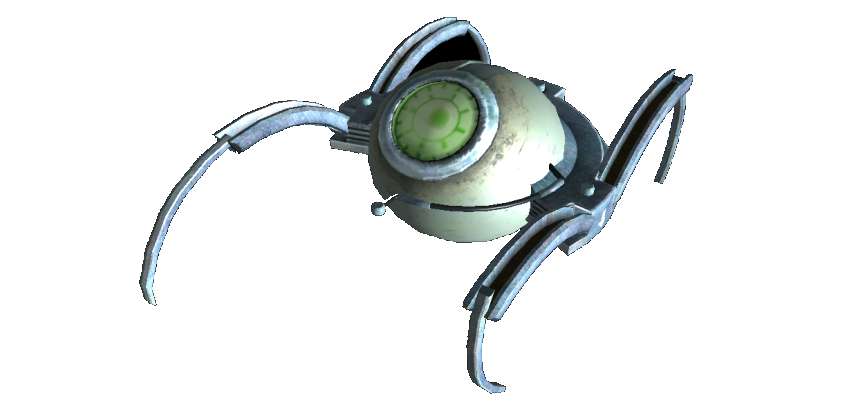 This story by Philip Dick takes a satirical look at the clichéd use of English idioms in popular fiction. Best known as a science fiction writer, Dick makes his point through the eyes of a man who believes he has stumbled upon an invasion of Earth by alien lifeforms that are so highly developed they can shed body parts at will. His story could cause major problems if more people were aware of it. In an age where it takes very little to set off a conspiracy theory, many people could ‘lose their mind’ wondering if it is true. More…
This story by Philip Dick takes a satirical look at the clichéd use of English idioms in popular fiction. Best known as a science fiction writer, Dick makes his point through the eyes of a man who believes he has stumbled upon an invasion of Earth by alien lifeforms that are so highly developed they can shed body parts at will. His story could cause major problems if more people were aware of it. In an age where it takes very little to set off a conspiracy theory, many people could ‘lose their mind’ wondering if it is true. More…